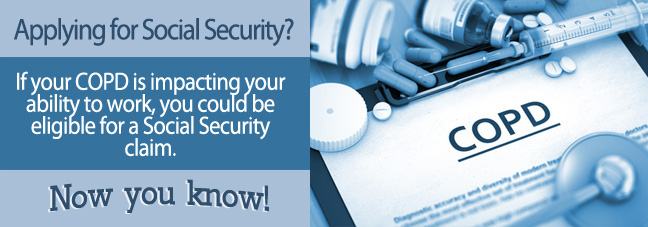If you struggle with the symptoms of Chronic Obstructive Pulmonary Disease (COPD), you may be eligible for financial assistance as awarded under a disability benefits program managed by the Social Security Administration (SSA). However, receiving a diagnosis of COPD does not automatically qualify you for compensation. You also have to meet the severity of symptoms standards listed under the medical guide called the Blue Book. One of the keys to meeting the severity of symptoms standard for COPD is to have missed work for 12 consecutive months.
Blue Book Listing for COPD
The first step to getting financial assistance under the disability benefits program run by the SSA is to confirm you have received a diagnosis for a medical condition that is listed in the medical guide called the Blue Book. COPD is listed in Section 3.02 of the Blue Book, which describes chronic respiratory disorders that develop specific diagnostic criteria.
COPD frequently starts with mild symptoms such as coughing and shortness of breath before turning into a serious respiratory disorder that places tremendous strain on the proper functioning of the heart.
Several tests for COPD determine the severity of the respiratory medical condition. As the most important diagnostic test, spirometry measures the flow of air in and out of the lungs. An applicant for Social Security disability benefits forces air out of the lungs for as long as possible to determine whether there is an obstructive airflow. The SSA places restrictions on those that take a spirometry test, such as receiving a stable medical diagnosis and not having changed respiratory medications within two weeks of completing the test.
Applicants for disability benefits for COPD also must complete a DLCO test, which measures the exchange of gases that travel across the cell membranes of both lungs. The final test is called an arterial gas measurement that determines the amount of oxygen, hydrogen, and carbon dioxide in the blood.

Applying for Disability Benefits With COPD
Gathering and collecting persuasive medical evidence that meets the SSA's severity of symptom guidelines is required when filing a claim for disability benefits. More than two-thirds of all disability claims are denied by the Social Security Administration for a variety of reasons. Lack of medical evidence represents the most common reason why the SSA denies claims for financial assistance.
Another common reason that disqualifies applicants for disability benefits is submitting incomplete and/or inaccurate information on the claim form. Also, if you fail to submit a disability claim before the deadline, the SSA will deny your claim for COPD.
Working with a Social Security disability attorney may assist you in submitting a convincing claim for financial assistance.
Possible Effects of a Disabling Medical Condition on You and Your Family
Dealing with a disability can place an incredible strain on you and your family. Losing a job because of severe COPD symptoms creates a financial hardship that can become serious enough to warrant consideration for filing bankruptcy paperwork. Financial difficulties often cause friction among family members, as well as damage professional relationships.
Severe COPD symptoms also prevent you from completing the most basic daily tasks, including taking out the garbage and putting your clothes through a wash and dry cycle.
Living with COPD does not have to be the end of living a productive life. Working with a Social Security disability lawyer might help you cope with the disease by receiving the financial assistance you deserve. Fill out a Free Case Evaluation today to get connected with an independent, participating attorney who subscribes to the website.